Are you planning on renovating the kitchen? You may have had some thoughts concerning the sink. And it’s quite evident that the most frequently used in the kitchen is the sink.
And this evidence suggests that one must dwell further when it comes to composition. If we pitch stainless steel vs quartz kitchen sink together, you will find multiple aspects that differ both the material entirely.
In fact, the sink’s substance determines the heat and stain resistance factor. However, both compounds exhibit exceptional durability and resilience.
It is crucial to understand the differences and choose a framework, which accounts for uncompromising functionality. We carried out rather assertive and interrogative research on both stainless steel and quartz with the budget in mind.
So, let’s get started.
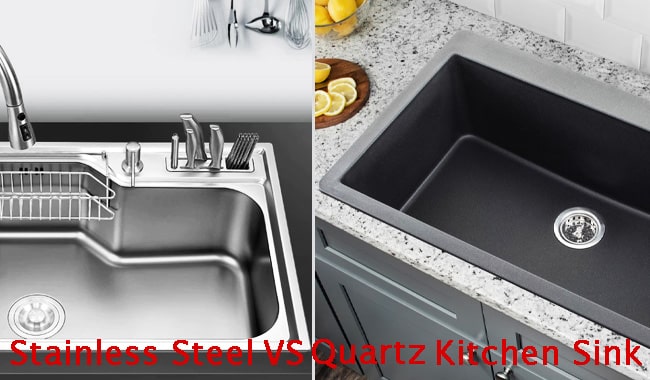
Difference Between Stainless Steel and Quartz Sink
When it comes to kitchen sinks, you already know there are plenty of construction materials to choose from.
As it happens, functionality and affordability come first in our minds while making the purchase. However, most of us disregard the maintenance and compatibility factor altogether.
Without further ado, we will jump right into the details. And first, you will learn about quartz sink material.
Quartz Kitchen Sink [Pros & Cons]
Nowadays, a lot of people opt for quartz in their kitchen. And why won’t they? Quartz has the inherent natural semblance without being natural at all.
The anthropogenic invention of acrylic resins with pulverized mineral composite gives quartz a hardwearing structure that is highly durable.
At this point, we are going to divulge the strengths and weaknesses of this material. And by doing so, we hope to provide you with all the information to make the right choice.
Pros
Heavy-Duty
Imagine a beautiful kitchen; what’s the first thing that comes to your mind? Is it as reliable as it portrays to be?
In the case of sink units, quartz’s prolonged ability to last long works in the users’ favor. The complex, crystalline structure provides the composite with enhanced strength and resistance.
Resistance to what exactly? Well, to begin with, the heat and scratch-resistant material can more than just sustain the hardwearing task you may throw at it.
As a matter of fact, quartz also maintains a highly stain-resistant property. Unlike all other options, this chemical compound offers ultra-powerful performance.
Therefore, most sink ware made of quartz comes with a warranty.
-
Food-Safety
No one in their right mind will allow appliances in their kitchen that account for adverse health effects. And to avoid such circumstances, quartz is an incredibly safe material.
The uniform and impermeable material refrain from passing any form of air and liquid, providing you an exceptional area to clean your utensils.
Subsequently, quartz sinks prevent the accumulation of germs and bacteria from food particles, resulting in a contaminant-free environment.
On the other hand, all these attributes of the material ensure an odorless atmosphere. Keeping your home stench-free is the compound’s ultimate forte.
Soundless
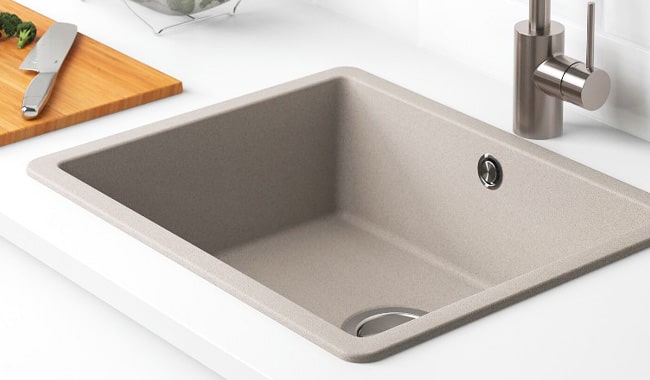
By soundless, we mean that quartz has an inherent ability to stay put compared to other kitchen sink compositions.
If we address the stainless steel vs quartz kitchen sink conundrum, quartz is significantly quieter. You no longer need to worry about waking the whole house while washing the dishes.
Versatility
When several minerals, based on silicon and oxygen, fuse, it establishes into a resilient product.
Besides being extremely robust, quartz is effortlessly pliant, although it has a stone-like appearance.
With a moderate degree of manipulation, the compound bents into stylish outcomes most suitable to the kitchen. Habits of cleanliness and hygiene are derived from beauty.
Hence, kitchen sinks made of this material are an ideal option as quartz can embrace virtually any color into its structure.
Most importantly, this feature leads to modern, contemporary kitchen sink designs that are desirable to look at. We can give you the guarantee of aesthetic value.
Easy-to-Clean
There is no way you would want trouble cleaning your kitchen sink. If anything, that’s where you will do all the necessary cleaning.
Therefore, it is crucial to avoid purchasing a sink, which stains readily. In fact, the non-porous surface of quartz ensures convenient cleaning at all costs.
Cons
Price
You will notice all the remarkable features of quartz. And truth be told, a little investment is a necessity to acquire high-quality material.
More significantly, compared to other expensive options, this compound is cost-effective. However, stainless steel is a relatively inexpensive choice than quartz.
Susceptible to Breakage
As mentioned earlier, quartz is like stone. Unfortunately, the resemblance to stone ends there. This sturdy material is prone to abrasion from dishes if you drop them, although highly unlikely.
Fading of Dark-colored Sinks
The problem with dark-colored kitchen sinks is not the appearance but the durability. Of course, there is no doubt about the longevity of quartz.
However, the dark color tends to wear off with time as the plates clash and graze with the sink, the scratches settle.
Stainless Steel Kitchen Sink [Pros & Cons]
Stainless steel fixtures in the kitchen are the most common choice, to say the least. You will find them everywhere.
And there’s a reason for it, and that’s the affordable price. Not only that, the weather-resistance ability of the steel alloy is an excellent inclusion to your kitchen sink.
Now, let us look at a few of the advantages and disadvantages surrounding stainless steel. And finally, you can choose your desired material for the kitchen.
NB. Want to know more about the difference between top-grade and low-grade stainless steel sinks, click here.
Pros
Rust Resistance
An essential element of steel alloy is its ability to stand firm against corrosion.
Everyone’s reliance on this factor is justified because all cleaning jobs involve water. Metals tend to rust in any given environment, sooner or later.
However, stainless steel retains its authenticity and the sleek, stylish outlook over time through the fine coating of chromium oxide.
It turns out, chromium readily reacts with atmospheric oxygen to create a protective layer that is rust-preventative.
Hygiene
The food-processing industry flourishes by including stainless steel in the packaging. In terms of sanitation, this metal alloy never failed to prove its worth.
Predominantly, the smooth, non-porous surface of this compound enables an uncomplicated cleaning approach.
Stainless steel prevents bacterial infestation.
This material provides you with a convenient surface to soak the dishes and clean off the residual food without worrying about foodborne illnesses.
Versatile
As previously mentioned, industries thrived with the invention of stainless steel, and so does the population. And all the credit goes to the alloy’s malleable quality.
With few modifications and transformations, there is virtually no limit to stainless steel’s structural outcomes.
Regarding sink products, we believe this material will come up with all the shapes and patterns to satisfy your preferences.
High Heat Resistance
Stainless steel withstands a whopping 1700℉ of high temperature. We assume that sums up every other concern for you.
Regarding your daily kitchen necessities, the heat resistance limit is more than sufficient.
Also, the low conductivity of steel alloy makes it optimal kitchenware that prevents heat buildup.
Lightweight and Durable
The strength-to-weight ratio of stainless steel is exceptional, to put it mildly. You see, the weight may seem insignificant, but that does not stop the alloy from being tough.
In fact, we observe the steel composite to have remarkable abilities to withstand abrasion.
If we consider this factor, stainless still may have won a battle on stainless steel vs quartz kitchen sink.
Otherwise stated, no amount of plate, dishes, or pan dropping will break the surface. The lightweight factor also makes the kitchen sink easy to install.
Recommended reading: Granite Composite Vs Stainless Steel Sinks, and Porcelain Vs. Stainless Steel Kitchen Sink.
Eco-Friendly
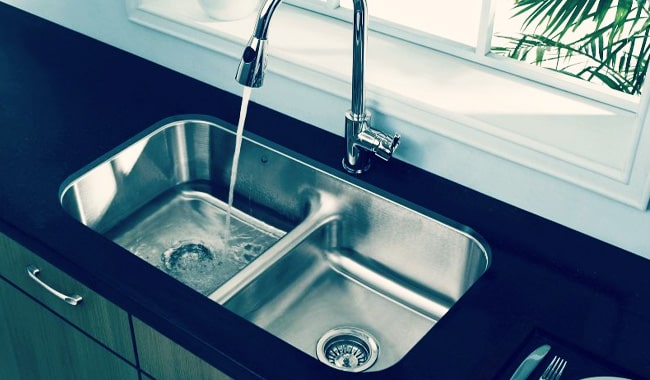
Another win for stainless steel is its environmentally friendly composition.
With a certifiable 100% recycling approach, this steel alloy is a buddy to humankind and helps save the ecosystem.
Inexpensive
Among all the significant aspects, this makes all buyers a little weak.
Despite not maintaining a budget, we always look for the cheap option that offers maximum features, and stainless steel might be it.
Cons
No Color Choice
Sad to say, stainless steel comes in only one color, and that is silver. No amount of manipulation will help it achieve any other color.
Flimsy
As opposed to the perks of stainless steel, the lightweight factor can also account for drawbacks. You will find that extreme force may bend the shape of your steel alloy sink.
Moreover, the flimsy structure of stainless steel can create annoying noises when washing dishes.
Not Entirely Stain-proof
Irrespective of easy-to-clean properties, the metal alloy is vulnerable to hard water deposits.
However, you may find a vinegar-based solution to rescue the calcification issue. Nonetheless, rusted items may leave adamant stains.
Prone to Scratch
Metal utensils have a damaging impact on stainless steel. The fine layer of the alloy is susceptible to scratches and dents.
Nevertheless, with a bit of scuffing, you will get rid of the grit and dirt buildup.
FAQs
- Are stainless steel sinks out of fashion?
We will surely not use that term, but we can confirm that stainless still sink ware is over-used.
It may not be an advanced option anymore, but, without any question, the steel alloy comes with its benefits.
- Are quartz sinks better than stainless steel?
An age-old question, is it not? It’s up to you to decide what favors your kitchen and preferences.
However, we will add, the additional cost of quartz is justifiable for the abundance of durability and designs.
- Are quartz sinks hard to keep clean?
Absolutely not, we guarantee that you will have no issues regarding the cleaning aspect. The non-porous surface must have some duty, after all.
- How long do stainless steel sinks last?
On average, stainless steel sinks can function, give or take, 15 to 30 years.
- Can you use vinegar on quartz?
We do not recommend using vinegar on quartz. As vinegar is acidic, it can ruin the outer layer of the quartz sink. Discoloration may occur.
Bottom Line
Our aim was to feed you with as much information about stainless steel and quartz sinks as possible.
As we were carefully listing all the pros and cons, we realized the war between stainless steel vs quartz kitchen sink merely depends on your personal choice.
Now, it’s time to get the best sink available in town.
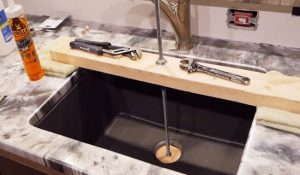
How to Install an Undermount Sink to a Granite Countertop
Plumbers are becoming expensive to hire for installing an undermount sink and it becomes costly for us. How it feels if you install it on your
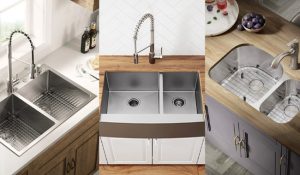
50/50 vs 60/40 vs 70/30 Kitchen Sinks | Head To Head Comparisons
Double Bowl Kitchen Sinks are a blessing for multitaskers. Not only do they save your time by creating an uninterrupted workspace, but also they increase
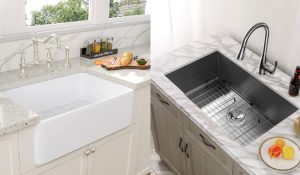
Porcelain Vs. Stainless Steel Kitchen Sink – Detailed Comparison
A well-structured and installed kitchen sink has the power to enhance the look of a kitchen. The materials used to make a sink play a
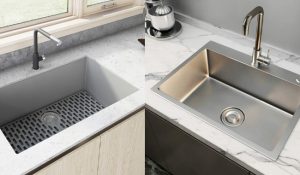
Granite Composite Vs Stainless Steel Sinks
Sinks are permanent fixtures in your kitchen, so a little bit of caution before the purchase brings fruition. Both granite and stainless steel make a
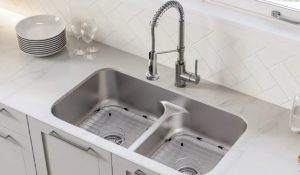
Things You Need to Know About Brand Kraus (as Sink and Faucet)
Sinks and faucets are one of the most important parts of a conventional home or work-loaded office nowadays. Perhaps, you cannot think about a kitchen
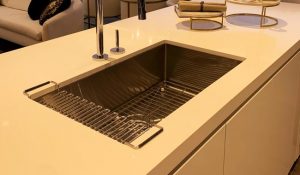
Kitchen Sink Buying Guide | 11 Important Things to Consider
Finding the right kitchen sink is crucial for a homeowner, as that can determine their entire mood while doing chores in their kitchen. However, with


